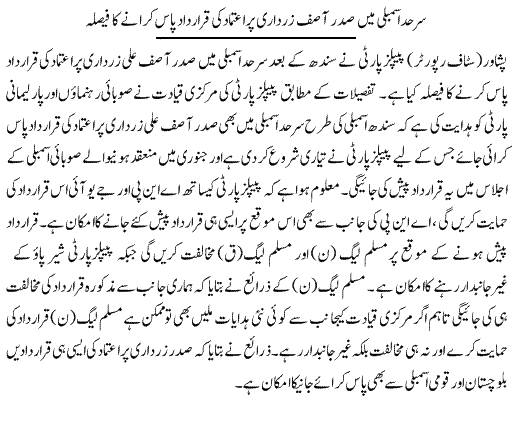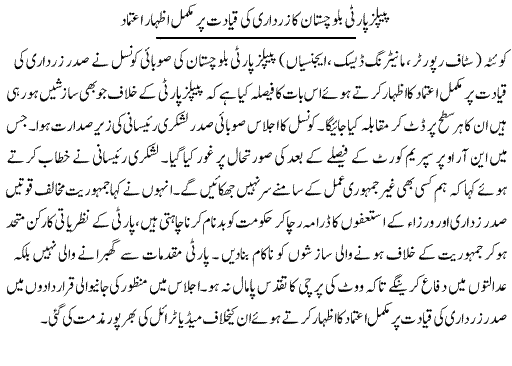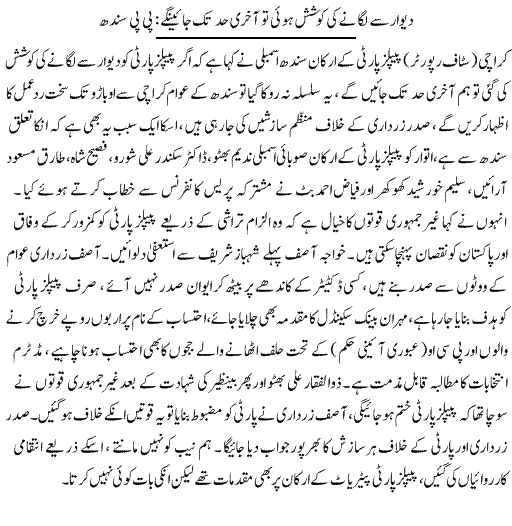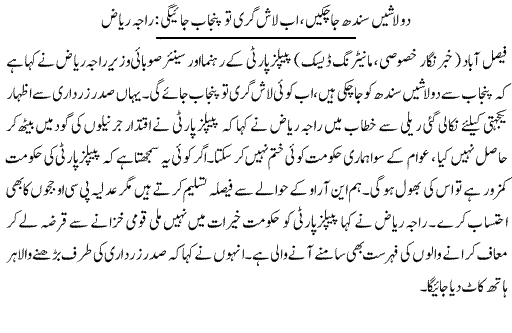United we stand for democracy. Reconciliation is the key word.

While the Supreme Court of Pakistan has struck down the National Reconciliation Ordinance (NRO), the Central Executive Committee of Pakistan People’s Party has very wisely reasserted their commitment to the process of national reconciliation in the country.
The Central Executive Committee (CEC) of the ruling Pakistan People’s Party (PPP) on Saturday, 19 Dec 2009, decided that party leaders would face National Accountability Bureau (NAB) cases revived after the Supreme Court declared the National Reconciliation Ordinance (NRO) unconstitutional. The CEC also decided that none of the ministers facing corruption charges would resign.
Later, briefing reporters, the president’s spokesman Farhatullah Babar quoted the president as saying the PPP would use “democracy and constitutionalism” as its weapons to fight its adversaries and foil all conspiracies against it.
He said the PPP co-chairman also categorically stated that the PPP would not be blackmailed into asking its ministers to resign merely on the basis of accusations against them, APP reported.
Addressing a news conference after the CEC meeting, which was chaired by President Asif Ali Zardari, party’s Secretary General Jahangir Badar and Information Secretary Fauzia Wahab said the meeting concluded that the PPP believed in the rule of law and supremacy of the constitution.
They said the party reiterated that it respected institutions and “hopes that all institutions will play their role while remaining within their ambit to serve the country”.
Defence: “The party decided to defend those party leaders who were politically victimised in the courts and will not leave them alone in keeping with its past policy. The party will not only strive to get justice for them but will also extend its help wherever there is injustice,” they added.
Badar said the PPP could give a befitting response to its opponents but it wanted to maintain its policy of reconciliation.
To another question, he said the PPP had faced accountability in the past and it was not afraid of the process.
He said no system except democracy could be successful in Pakistan in the prevailing geo-political environment. He said we could strengthen solidarity and ensure progress of the country only through democracy.
Source
In the words of an editorial in Daily Times:
“Prime Minister Yousaf Raza Gilani mounted a vigorous defence of President Asif Ali Zardari during an interaction with the media. His thrust was that all the cases against the president were politically motivated and, despite spending 12 years in jail, nothing had been proved against him. ..Party consultations in the presidency and with allies seem to convey the impression that the PPP has decided there will be no resignations because such a course night open a Pandora’s box whose ultimate victim could well be the president… Those opposed to Mr Zardari or the PPP may want to go beyond the remit of the SC verdict, but they are on thin constitutional and legal ground here. Now that the PPP seems to have girded up its loins, the danger of political confrontation (with the PML-N first and foremost) and between the executive and judiciary cannot be ruled out. The best advice to all players would be to exercise restraint in the straitened circumstances in which the country finds itself, let politics be conducted in a civilised and democratic spirit and let each institution of state function within its own orbit, not on others’ turf. ” Source
Pathway to Sustaining Democracy
1. Reconciliation with all, in particular with other democratic parties in the parliament, including PML-N, ANP, MQM, PML-Q and JUI-F.
2. Avoiding unnecessary confrontation with other institutions of the state including judiciary and army.
3. Polite assertion and exercise of the constitutional supremacy of the parliament and the democratic government.
4. Eradication of corruption at all levels.
5. Complete freedom to media subject to the media’s own defined code of conduct.
5. Service, with dedication, of the people of Pakistan according to the PPP’s election manifesto.
6. Commitment towards a ruthless military operation against all sectarian and jihadi organisations and elements who have challenged the writ of the state.
Finally, don’t be provoked. It is a test match, not 20-20. The PPP government’s democratic and constitutional position is very strong; don’t play on your opponents’ pitch; stand your ground. Reconciliation is the key word!

After the NRO
By Ayesha Siddiqa
18 Dec, 2009. With Thanks. DAWN
Now that the NRO problem has apparently been resolved people are jumping with joy. There are some commentators who believe that this represents the strengthening of the system and democracy, that the Supreme Court verdict is a warning for presumptuous, overly ambitious and corrupt politicians.
The decision certainly is a milestone, but what does it mean for the overall learning process of the various stakeholders in the country’s power politics? And will it influence the future of Pakistan’s politics? These are two basic points to ponder.
Although it can be argued that the NRO was always controversial and people were eager to sort the matter out soon after it came into existence, there was always the possibility of the issue getting sidelined due to workable political arrangements.
It cannot be ruled out that if relations between Asif Zardari and the PML-N — more precisely, the Sharif brothers — had been better there might have been a possibility of an agreement being reached. Or perhaps if the president had not made the fatal mistake of trying to change the balance of civil-military relations and getting caught in the act, the different forces might not have aligned against him so cohesively.
Not that the present decision is not welcome. However, it is also a fact that some hidden forces were making a point of exposing the president’s questionable behaviour and decisions and hiding that of many others.
No wonder Asif Zardari cooperated in the NRO case and did not really try to hold back information. After all, there are others who were part of the NRO as well, including the MQM. Though the NRO pertained to cases of financial corruption, military dictator Pervez Musharraf had also included in the NRO criminal cases that did not technically belong there.
It will now be interesting to see if the Supreme Court actually takes the matter to its ultimate conclusion by also questioning those who pushed forward the NRO. Surely, it will take Musharraf and those of his close aides who had cobbled this questionable law together to task. Since the highest court has jumped into the fray of supporting state institutions before they crumble forever, the task should be completed.
One cannot undermine the significance of public perception. It is equally important for people to have faith in a judgment and not see it as driven by any political or other bias. Building faith in the judicial system is vital and calls for accountability of all other state institutions as well to strengthen the perception that the decision on the NRO was in good faith and to strengthen the rule of law.
But if a question is asked about whether the decision signifies the strengthening of the democratic process and civilian institutions, the answer must be in the negative. Since the perception regarding the decision is that it strengthens the armed forces and their ability to manipulate political stakeholders, it is not possible to see a major shift in the balance of power.
The decision does coincide with the growing anger of the security establishment against the civilian government for becoming ‘too big for its boots.’ Given the friction between Islamabad and GHQ over the Kerry-Lugar law and other issues, the military is certainly coincidentally, if nothing else, a prime beneficiary of the Supreme Court decision. A humiliated president has lesser possibilities with which to tackle a rival institution.
The presidency-GHQ tension denotes a third critical attempt by the political class to curtail the military’s power. The first attempt was made by Zulfikar Ali Bhutto, who inherited a relatively weak army and had ample room to reduce its relative power. He partly tried to do it through building institutional mechanisms such as the joint chiefs of staff committee and the defence ministry and putting all service chiefs under the supreme command of the prime minister. However, he did not put spirit into his reforms and ended up strengthening the military.
Nawaz Sharif was the second leader to get a similar opportunity. It was hoped that he could make headway because he belonged to the most powerful ethnic group and had managed to infiltrate the higher rungs of the officer cadre. Probably the reason that the army views Nawaz Sharif with suspicion is due to his ability to partially and temporarily divide the officer cadre. The appointment of Gen Ziauddin Butt as the new army chief replacing Gen Musharraf appeared to be accepted by a number of senior army officers. However, Sharif blew the chance because of his final rash move.
Most recently, Asif Zardari also thought of undercutting the phenomenal power of the military by convincing the United States to support the civilian set-up versus the military. Zardari was instinctively right in assessing that he had time on his side in making the move. The army was seen in a bad light due to a decade of Musharraf’s rule and people were talking about strengthening political institutions and decreasing the power of the armed forces. Zardari’s formula: it would take the Islamabad-Washington partnership to do the job.
But President Zardari seems to have fallen victim to his lack of understanding of the military, its institutional dynamics and the importance of creating internal partnerships and institutional protective barriers to achieve this objective. For instance, he did not realise that the same civil society that protested against the military would stand up to defend the ISI and oppose provisions in the Kerry-Lugar bill to defang the military. Nor did he understand the worth of putting life into the available institutions if the power balance had to be corrected.
In fact, what numerous politicians have failed to understand is the need to put life into the ministry of defence, to build its capacity and ‘civilianise’ its power or decision-making structure. Since the defence ministry is the only institutional cushion between the political government and the military, its capacity is critical. Politicians in Pakistan fall prey to their insecurity regarding lack of time and miss the point.
Now, the president can think about extending the deadline for repealing the 17th Amendment to be able to play a role in the extension or appointment of the army chief. That’s his last but temporary lifeline. He could buy some time by giving a cold shoulder to the US, but these are temporary mechanisms. It will be a while before another opportunity comes along for the civilian stakeholders.
The writer is an independent strategic and political analyst.
ayesha.ibd@gmail.com
By email:
By Mir Munsif
After Sindh, NWFP (Pakhtoonkhwa Provice) and Baluchistan assembly vow to pass the resolution in favor of Asif Zardari.The democratic verdict is going to stand by with democratic forces,and only forces who are working against democracy are Mighty Establishment+Ultra Rightist workers and parties+Pseudo Media and Politicians+Some segment of Self righteous Pro dictatorship ppl from Central Punjab.
Through these resolutions in various assemblies,the representative of ppl call in confidence in the leadership of President of Islamic Republic of Pakistan Asif Ali khan Zardari.
Detail about whole Pakistan.
NWFP (Pakhtunkhwa)

Balochistan

Sindh

Punjab

PPP and PML-N agree to cease fire
By Syed Irfan Raza
Tuesday, 22 Dec, 2009
Prime Minister Gilani called on President Zardari at President House.—Online
ISLAMABAD: The PPP and the PML-N have reached an accord under which the former has assured the latter of doing away with the 17th Amendment and in return the PML-N has promised to support President Asif Ali Zardari in the current political crisis.
According to sources in the presidency, Prime Minister Yousuf Raza Gilani apprised president on Monday of the outcome of his meeting with Punjab Chief Minister Shahbaz Sharif in Lahore earlier in the day.
Mr Gilani informed the president that the PML-N had promised to support the PPP in the situation that has arisen after the scrapping of the National Reconciliation Ordinance.
A marked difference was observed in the stance of the PML-N after the Lahore meeting.
‘We have never demanded resignation of President Zardari and we don’t want any confrontation at this stage,’ PML-N secretary general Ahsan Iqbal said.
‘We believe that in the present circumstances the president is the best judge to decide whether or not he should resign,’ he said.
He said the PML-N had always urged the PPP to fulfil the commitments it had made in the Charter of Democracy.
‘If the PPP fulfils its commitments, addresses people’s problems and ensures good governance we will not demand any change.’
A PPP leader said: ‘Our leadership believes that the fresh stance of the opposition party is a big achievement and will provide further strength to the government to face different challenges.’
PML-N leader Siddiqul Farooq also issued a statement which said: ‘Our party’s position is that Zardari should not resign.’
He said the PML-N believed that President Zardari enjoyed immunity under Article 248 the Constitution and no case could be reopened against him.
A source in the presidency said: ‘The ruling party is confident that attempts to derail the democratic system can be foiled by forging unity among political parties.’
Presidential spokesman Farhatullah Babar termed the statements of PML-N leaders in support of President Zardari a significant development in the current political situation.
http://www.dawn.com/wps/wcm/connect/dawn-content-library/dawn/news/pakistan/04-defending-court-zardari-gilani-qs-05
Attempt to oust govt will be resisted with full might: PM
By Amjad Mahmood
Tuesday, 22 Dec, 2009
Prime Minister, Syed Yousuf Raza Gilani exchanges the views with Punjab Chief Minister Shahbaz Sharif during meeting in Lahore.
LAHORE: Prime Minister Yousuf Raza Gilani is reported to have conveyed to Punjab Chief Minister Shahbaz Sharif a tough message from his party that it will resist with its full might any attempt to destabilise or dislodge its government.
‘No-one should be under any illusion that he can dislodge our government and keep enjoying power himself,’ sources quoted him as telling the chief minister during a meeting here on Monday.
The one-to-one meeting at Mr Sharif’s house in Defence lasted more than an hour.
This was their second meeting in 12 days held at the initiative of the prime minister in the wake of harsh statements made by some hawks in the PML-N, demanding resignation of President Asif Ali Zardari and federal ministers who were beneficiaries of the National Reconciliation Ordinance.
‘I’ve always accommodated you despite criticism from my own party, but you’re letting me down by taking a hard line and directly attacking PPP Co-Chairperson Asif Zardari,’ he was quoted as saying.
The Pakistan Muslim League-N leader was warned that the entire system would collapse if attempts were made to remove one pillar of the state, the sources said.The chief minister informed the prime minister that the PML-N leadership had taken notice of the matter and told the hawks at an informal meeting in Islamabad that the party would not seek resignation of President Zardari.
He assured Mr Gilani that the PML-N would not take any step that could jeopardise the system, but complained about statements made by Governor Salman Taseer and some PPP leaders which had raised the political temperature.
The two leaders agreed to avoid confrontation and not to issue harsh statements against each other’s leaders or to demand their resignation.
They also agreed to continue and strengthen their coalition in Punjab and discussed expansion of the provincial cabinet which has been due for about one and a half years. The PPP will get six more posts in the cabinet under the expansion plan.
The prime minister told Mr Sharif that there would soon be ‘good news’ on the 17th Amendment. He promised to take the opposition into confidence on the new accountability law.
APP adds: According to a statement issued by the Prime Minister’s House in Islamabad, both leaders vowed to protect and strengthen the democratic system and to work for supremacy of parliament.
‘They agreed that the present democratic system earned through unprecedented struggle by political parties and the people of Pakistan would be protected and strengthened at all costs for the welfare of the people.’
They said all institutions should work under the ambit of the Constitution.
‘Both the leaders agreed that supremacy of parliament, which reflects the will of the 170 million people of Pakistan, rule of law and strengthening of state institutions would be ensured.’
The prime minister said: ‘The present government has taken lead over past regimes by presenting itself for accountability.’
He said the government respected judgments of the Supreme Court.
The chief minister praised the prime minister’s policy of reconciliation and politics of consensus, particularly the role played by him in building consensus in the National Finance Commission.
Both the leaders emphasised that the NFC accord was a fruit of democracy which would ensure economic prosperity in all parts of the country.
http://www.dawn.com/wps/wcm/connect/dawn-content-library/dawn/the-newspaper/front-page/attempt-to-oust-govt-will-be-resisted-with-full-might-pm-229